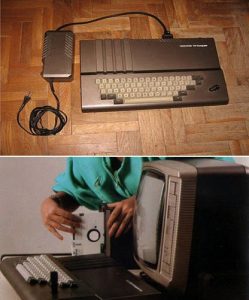VT TVC TV-computer
VIDEOTON manufactured the TVC computer between 1985 and 1988 as part of the School Computer Program. The computer was produced in three versions, which differed in the size of the main memory (top image: 32K, 64K; bottom image: 64K+) and their motherboard.
License-based localization; the predecessor of the machine is the Enterprise 128 computer, which was only later distributed in Hungary.
Use
The TVC is designed as a school computer, primarily for educational purposes.
Due to its very high price, it was mainly purchased by schools (with government support, within the framework of the School Computer Program)
Structure
Central unit
Byte-organized machine: 8 bpB
- CPU: Zilog Z80 microprocessor; clock speed: 3.125 MHz
- main store:
- 32 KB / 64 KB RAM 4116
- 20 KB / 24 KB ROM
- VRAM:
- 32K, 64K: 16KB
- 64K+: 64KB
- calculator: ALU built into the microprocessor
- Channel: 4 freely usable expansion rails for connecting external devices
Periphery
- backup:
- cassette recorder ( BRG )
- 64K+: two 1MB floppy disks
- external devices:
- RGB monitor or TV (for connecting composite video or antenna signals)
- keyboard (57 character keys + 9 function keys)
- joystick (built-in) for cursor movement
- Centronics printer
Full presentation of technical parameters: VIDEOTON TV-Computer
Operation
Screen resolution:
- in graphics mode 1024*960 pixels (CRTC 6845)
- in character mode: 24 lines, including
- 2 colors (monochrome) 64 chpl
- 4 colors 32 chpl
- 16 colors 16 chpl
Character set: 254 normal + 64 special characters, (with 10*8 pixels/character resolution).
The sound generator produced the frequency by dividing the clock signal, in 16 volume levels; when the frequency divider was turned off, it functioned as a 4-bit D/A converter, meaning it could play digitized music.
Program set
- operating system:
- TVC OS (ROM-based)
- UPM (a version of CP/M rewritten for TVC)
- 64K+:VT-DOS (compatible with DOS 3.10, for reading IBM PC floppy disks)
- programming languages:
- 32K, 64K: TVC BASIC V1.2
- 64K+: TVC BASIC V2.2
- Forth (optional)
About 40-50 application programs were available for purchase separately, including word processors, mail servers, etc.
The educational programs were distributed by the National Program Office (OPI), free of charge to schools.
VIDEOTON also sold many game programs (Chess, Griff, Malex) for the machine.
Historical curiosities
The microprocessor allowed simultaneous access to 64 KB (16-bit address), but the total size of the connectable memory was 152 KB (200 KB in the 64 K+ version); during program execution, the current 64 KB address range could be selected by paging, by turning on/off an operation enabling signal.
The 64K+ model could store up to 4 images at a time.
It had a built-in color switch for (poor quality) color display; however, it improved image quality in the monochrome version.
The very high production costs could not be reduced, so the import dumping of the Commodore Plus/4 (Novotrade-Ápisz), then the appearance of the Primo and private imports forced the TVC out of the market within 3 years.
Resources
Historical Overview: VIDEOTON TVC
General description: VIDEOTON Computer Factory, 1988, page 14
Detailed review and evaluation: Mikrokártótógép Magazin, 86/5. Pages 20-23.
It is also worth reading the review of "Oli" ( Russian Oliver )
Created: 2016.06.08. 22:28
Last modified: 2025.02.04. 18:09

